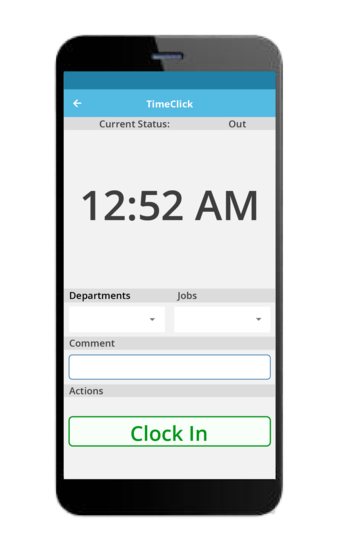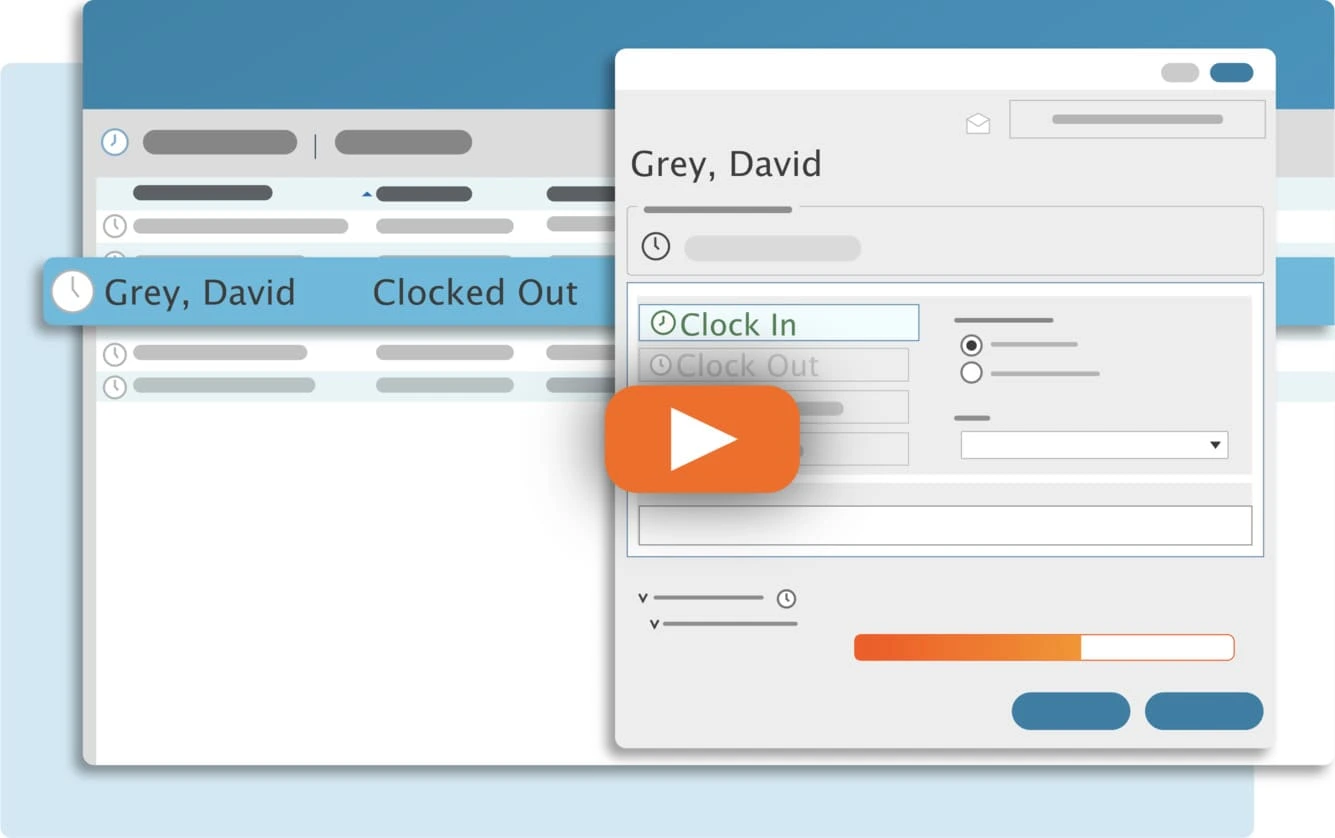Understand the legal landscape for employee break time across the United States—and what your business must do to stay compliant.
Whether you're managing a small team or running a multi-state operation, knowing when employees are legally entitled to meal and rest breaks is critical. While federal law under the Fair Labor Standards Act (FLSA) offers limited guidance, many states have their own break requirements—some stricter, some nonexistent. Add in industry-specific rules and special protections for minors and nursing mothers, and the break law picture gets complicated fast.
This guide breaks it down. We’ll cover federal standards, highlight key state differences, and explain what employers need to do to stay compliant in 2025.
Table of Contents
- Federal Break Rules: What Employers Are—and Aren’t—Required to Do
- Special Rule: Lactation Breaks for Nursing Employees
- State Laws: Where Breaks Are Required
- Special Break Rules for Minors, Healthcare Workers, and Union Employees
- Minors (Under 18)
- Healthcare and Emergency Personnel
- Unionized Workplaces
- Compliance Tips for Employers
- State-by-State Meal and Rest Break Laws
- Frequently Asked Questions
- Final Thoughts
Federal Break Rules: What Employers Are—and Aren’t—Required to Do
Under the Fair Labor Standards Act (FLSA), there’s no federal law that requires employers to give adult employees meal or rest breaks. In short: unless your state says otherwise, you don’t have to provide any breaks at all.
That said, if you do offer breaks, federal rules determine how they must be treated for pay purposes:
- Short breaks (5–20 minutes): Must be paid and counted as hours worked.
- Meal breaks (30+ minutes): Can be unpaid, but only if the employee is completely off duty.
- Extended or unauthorized breaks: Don’t have to be paid—if your policy clearly states this and you enforce it consistently.
Special Rule: Lactation Breaks for Nursing Employees
Under the PUMP for Nursing Mothers Act (in effect since late 2022), nearly all employers must give nursing employees:
- Reasonable break time to express breast milk, for up to one year after childbirth
- A private, non-bathroom space for pumping
These breaks don’t have to be paid, unless required by state law or company policy. Small businesses (fewer than 50 employees) may claim an exemption only if compliance would cause serious difficulty or expense.
Bottom line: federal law sets the floor. It doesn’t require breaks—but if you give them, you must follow specific pay rules. And for nursing employees, some break time is mandatory.

State Laws: Where Breaks Are Required
State break laws are all over the map. Some states require both meal and rest breaks. Others only mandate one. Many—like Texas, Florida, and Georgia—don’t require any breaks at all. In those cases, only federal rules apply.
Here’s how state break laws typically play out:
- Meal breaks: Often required after 5 to 7.5 hours of work. Usually unpaid, as long as the employee is off duty.
- Rest breaks: Typically 10–15 minutes for every 4 hours worked. These must be paid time.
- Minors: Most states require meal breaks after 4–5 hours for employees under 18—even when adults aren't entitled to one.
Break-friendly states include:
- California: 30-minute meal after 5 hours, plus paid 10-minute rest every 4 hours. Missing a break triggers penalty pay.
- Oregon: Break schedule scales with shift length—more hours = more meals and rest periods. Strict enforcement, especially in healthcare.
- Washington: Recent updates require hospitals to log missed breaks. Statewide: meal after 5 hours, rest every 4.
Recent legislative updates:
- Illinois (2023): Now requires a second 20-minute break for workdays over 12 hours.
- Vermont: Broad “reasonable opportunity” law covers meal/restroom needs—less strict, but still enforceable.
TIMECLICK TIP
If your team works across multiple states, you need to follow the most protective rule that applies to each employee—don’t assume one policy fits all.
Bottom line: You can’t rely on federal law alone. Check state-specific requirements wherever you operate—or risk noncompliance penalties.
Special Break Rules for Minors, Healthcare Workers, and Union Employees
While most break laws apply to adult employees in typical industries, there are key exceptions. Special rules exist for minors, workers in healthcare or emergency services, and employees covered by union contracts.
Minors (Under 18)
Most states require meal breaks for minors—even if they don’t require them for adults. Common rules include:
- 30-minute break after 4 or 5 hours: Seen in states like Florida, Ohio, and New Jersey.
- Extra rest breaks: Utah mandates a 10-minute rest every 3 hours for minors.
- Longer shifts: Oklahoma requires both a 30-minute break at 5 hours and a 1-hour break for minors who work 8 hours.
TIMECLICK TIP
If you employ minors, don’t just rely on adult labor laws—check your state’s child labor statutes. They're often stricter and separately enforced.
Healthcare and Emergency Personnel
In hospitals and emergency response jobs, standard breaks may not always be practical. Many states allow flexibility:
- “On-duty” meals: States like Colorado allow paid, on-the-clock meal breaks when relief coverage isn’t available.
- Safety exemptions: Connecticut and Delaware waive break requirements when breaks would compromise public safety.
- Enforcement: Washington now requires hospitals to track and report missed breaks for nurses and frontline staff. Noncompliance can lead to penalties starting in 2026.
Unionized Workplaces
Employees covered by a collective bargaining agreement (CBA) may follow a different break schedule than state law requires—if the contract spells it out. Examples:
- California: Unionized workers in construction, trucking, and security can have alternative break rules, as long as their CBA includes specific terms on breaks and overtime.
- Delaware & Connecticut: Both allow union agreements to override standard meal break requirements.
- Illinois: Updated law still respects union-negotiated alternatives, as long as they meet or exceed the break protection standard.
Rules can vary a lot depending on who your employees are and what kind of work they do. Always check for carve-outs that apply to minors, unionized teams, or roles in healthcare and emergency services. These groups often have stricter—or more flexible—break requirements than the general workforce.

Compliance Tips for Employers
If you're managing schedules or processing payroll, break compliance is one area you can't afford to overlook. Missed breaks can trigger lawsuits, penalties, or owed back pay—especially in strict states like California or Oregon.
- Know your state laws: Don't assume federal standards are enough. Many states have their own break rules with real teeth.
- Use scheduling software: Automating break timing helps ensure compliance and reduces human error.
- Track break time accurately: If breaks are paid, log them like any other work time. If unpaid, ensure they're duty-free and documented — tools like TimeClick’s free time card calculator can help you track hours correctly.
- Post your policy: Some states require visible break policy postings. Even if it’s not required, transparency helps reduce disputes.
TIMECLICK TIP
Audit your time records regularly. If you’re in a break-required state, spot-check for missed or short breaks and fix issues before they turn into claims.
Simplify Time Tracking with TimeClick!
Download our free trial—simple, secure, offline tracking, no fluff.

State-by-State Meal and Rest Break Laws
Break laws in the U.S. vary widely by state. Some require strict schedules for rest and meal periods, while others leave it up to the employer. To help you stay compliant, we’ve compiled a detailed, state-by-state breakdown of current meal and rest break rules for adult employees. This table covers whether breaks are required, if they must be paid, and any important exceptions to be aware of.
If your state isn’t listed as requiring breaks, that means the default federal law applies — breaks are optional but must be paid if they’re under 20 minutes.
| State | Meal Break Required? | Rest Break Required? | Paid or Unpaid | Special Notes / Exceptions |
|---|---|---|---|---|
| Alabama | No – State law does not require a meal break for adult employees | No – State law does not require a rest break for adult employees | n/a | 30-min break required for minors (14–15) after 5 hrs. Adults follow federal rules. |
| Alaska | No – State law does not require a meal break for adult employees | No – State law does not require a rest break for adult employees | n/a | 30-min break for minors (14–17) after 5 hrs. Adults follow federal rules. |
| Arizona | No – State law does not require a meal break for adult employees | No – State law does not require a rest break for adult employees | n/a | No break laws. Federal standards apply. |
| Arkansas | No – State law does not require a meal break for adult employees | No – State law does not require a rest break for adult employees | n/a | No break law for adults. Lactation breaks required. No minor break law. |
| California | Yes – 30-minute unpaid meal break required after 5 consecutive hours | Yes – 10 min per 4 hrs | Meal: Unpaid; Rest: Paid | Strict laws. Missing break = 1 hr pay penalty. CBAs may modify terms in some sectors. |
| Colorado | Yes – 30-minute unpaid meal break required after 5 consecutive hours | Yes – 10 min per 4 hrs | Meal: Unpaid if off-duty; Rest: Paid | Applies to retail, food, health. On-duty meals must be paid. |
| Connecticut | Yes – 30-minute meal break required for shifts longer than 7.5 hours | No – State law does not require a rest break for adult employees | Unpaid | Exemptions for small shifts, single staff, emergencies. No separate minor rule. |
| Delaware | Yes – 30-minute meal break required for shifts longer than 7.5 hours | No – State law does not require a rest break for adult employees | Unpaid | Minors get 30-min break after 5 hrs. CBA exemptions allowed. |
| Florida | No – State law does not require a meal break for adult employees | No – State law does not require a rest break for adult employees | n/a | Minors (under 18) get 30-min break after 4 hrs. Adults follow federal rules. |
| Georgia | No – State law does not require a meal break for adult employees | No – State law does not require a rest break for adult employees | n/a | No break law for any age. Federal standards apply. |
| Hawaii | No – State law does not require a meal break for adult employees | No – State law does not require a rest break for adult employees | n/a | Minors (14–15) get 30-min break after 5 hrs. No break rule for 16+. |
| Idaho | No – State law does not require a meal break for adult employees | No – State law does not require a rest break for adult employees | n/a | No state break laws for any age. Federal rules apply. |
| Illinois | Yes – 20-minute meal break required for shifts of 7.5+ hours | No – State law does not require a rest break for adult employees | Unpaid | Second 20-min break required if working 12+ hrs. Minors under 16 get 30-min break after 5 hrs. |
| Indiana | No – State law does not require a meal break for adult employees | No – State law does not require a rest break for adult employees | n/a | Minors under 18 must receive 1–2 breaks totaling 30 min if working 6+ hrs. No adult requirement. |
| Iowa | No – State law does not require a meal break for adult employees | No – State law does not require a rest break for adult employees | n/a | Minors under 16 get 30-min break after 5 hrs. Adults follow federal rules. |
| Kansas | No – State law does not require a meal break for adult employees | No – State law does not require a rest break for adult employees | n/a | No meal/rest law for adults or minors. Defaults to federal standards. |
| Kentucky | Yes – 30-minute unpaid meal break required between 3rd and 5th hour of work | Yes – 10-minute paid rest break required per 4 hours worked | Meal: Unpaid; Rest: Paid | Applies to most employees. No separate minor rule needed. |
| Louisiana | No – State law does not require a meal break for adult employees | No – State law does not require a rest break for adult employees | n/a | Minors under 18 get 30-min break after 5 hrs. No break law for adults. |
| Maine | No – State law does not require a meal break for adult employees | Yes – 30-minute unpaid rest break required after 6 hours if 3+ employees on shift | Unpaid | No separate minor rule. Exempt if fewer than 3 staff or in emergencies. |
| Maryland | Yes – 30-minute meal break required for retail workers (50+ employees) | Yes – 15-minute paid rest break for 4–6 hour shifts | Meal: Unpaid; Rest: Paid | Applies to retail with 50+ employees. Minors get 30-min break after 5 hrs. |
| Massachusetts | Yes – 30-minute unpaid meal break required for shifts over 6 hours | No – State law does not require a rest break for adult employees | Unpaid | Applies to most. Some factory roles may have different rules. Minors covered by general law. |
| Michigan | No – State law does not require a meal break for adult employees | No – State law does not require a rest break for adult employees | n/a | Minors under 18 get 30-min break after 5 hrs. No requirement for adults. |
| Minnesota | Yes – Employers must provide sufficient unpaid time to eat during 8+ hour shifts | Yes – Paid restroom breaks must be available roughly every 4 hours | Meal: Unpaid; Rest: Paid | No specific minutes, but breaks under 20 min must be paid. No minor-specific rule. |
| Mississippi | No – State law does not require a meal break for adult employees | No – State law does not require a rest break for adult employees | n/a | No break requirements. Applies to all ages. Federal default. |
| Missouri | No – State law does not require a meal break for adult employees | No – State law does not require a rest break for adult employees | n/a | No state rules. Federal standards apply to all employees. |
| Montana | No – State law does not require a meal break for adult employees | No – State law does not require a rest break for adult employees | n/a | No state break laws. No separate rule for minors. |
| Nebraska | Yes – 30-minute unpaid meal break required in specific industries (e.g. workshops, assembly plants) | No – State law does not require a rest break for adult employees | Unpaid | Required for assembly plants, workshops, mechanical establishments. Others follow federal law. |
| Nevada | Yes – 30-minute unpaid meal break required for shifts of 8+ hours | Yes – 10-minute paid rest break per 4 hours worked | Meal: Unpaid; Rest: Paid | Rest break not needed if total shift is less than 3.5 hrs. No separate minor rule. |
| New Hampshire | Yes – 30-minute meal break required after 5 consecutive hours | No – State law does not require a rest break for adult employees | Unpaid | Can be waived by written mutual agreement. Applies to most workers. |
| New Jersey | No – State law does not require a meal break for adult employees | No – State law does not require a rest break for adult employees | n/a | Minors under 18 get 30-min break after 5 hrs. No adult requirement. |
| New Mexico | No – State law does not require a meal break for adult employees | No – State law does not require a rest break for adult employees | n/a | No required breaks. If employer offers breaks under 30 minutes, breaks must be paid. |
| New York | Yes – Meal break required: 30 to 60 minutes depending on shift time and industry | No – State law does not require a rest break for adult employees | Unpaid | Complex schedule. Factory workers: 60-min lunch. Additional 20-min break for long day shifts. |
| North Carolina | No – State law does not require a meal break for adult employees | No – State law does not require a rest break for adult employees | n/a | Minors under 16 get 30-min break after 5 hrs. No adult requirement. |
| North Dakota | Yes – 30-minute unpaid meal break required after 5 hrs if two or more staff on duty | No – State law does not require a rest break for adult employees | Unpaid | Meal required only if two or more employees on shift. No separate rule for minors. |
| Ohio | No – State law does not require a meal break for adult employees | No – State law does not require a rest break for adult employees | n/a | Minors under 18 get 30-min break after 5 hrs. Adults follow federal law. |
| Oklahoma | No – State law does not require a meal break for adult employees | No – State law does not require a rest break for adult employees | n/a | Minors under 16 get 30-min break per 5 hrs and 1 hr break per 8 hrs. No rule for adults. |
| Oregon | Yes – 30-minute unpaid meal break required every 6 hours worked | Yes – 10-minute paid rest break per 4 hours worked | Meal: Unpaid; Rest: Paid | Strict. Additional breaks required for long shifts. Minors get 15-min rest instead of 10. |
| Pennsylvania | No – State law does not require a meal break for adult employees | No – State law does not require a rest break for adult employees | n/a | Minors under 18 get 30-min break after 5 hrs. Seasonal farmworkers also protected. |
| Rhode Island | Yes – 20-minute break for 6+ hrs or 30-minute break for 8+ hrs | No – State law does not require a rest break for adult employees | Unpaid | If fewer than 3 staff and employee can eat while working, meal break can be waived. Applies broadly. |
| South Carolina | No – State law does not require a meal break for adult employees | No – State law does not require a rest break for adult employees | n/a | No break laws for any age group. Federal default applies. |
| South Dakota | No – State law does not require a meal break for adult employees | No – State law does not require a rest break for adult employees | n/a | No state meal/rest break laws. Applies to all workers. |
| Tennessee | Yes – 30-minute unpaid meal break required for shifts of 6+ hours | No – State law does not require a rest break for adult employees | Unpaid | Break cannot be during or before first hour. Some operational exceptions allowed. |
| Texas | No – State law does not require a meal break for adult employees | No – State law does not require a rest break for adult employees | n/a | No state requirement. Federal law applies. Local ordinances may exist (e.g., Austin construction). |
| Utah | No – State law does not require a meal break for adult employees | No – State law does not require a rest break for adult employees | n/a | Minors under 18: 30-min meal by 5th hr; 10-min rest every 4 hrs. No adult requirement. |
| Vermont | Yes – Employers must provide a reasonable opportunity to eat | No – State law does not require a rest break for adult employees | Paid if under 20 min | Must allow time to eat and use restroom. No strict timing. Lactation breaks required. |
| Virginia | No – State law does not require a meal break for adult employees | No – State law does not require a rest break for adult employees | n/a | Minors under 16 get 30-min break after 5 hrs. No rule for 16+. |
| Washington | Yes – 30-minute unpaid meal break required for shifts longer than 5 hours | Yes – 10-minute paid rest break required every 4 hours worked | Meal: Unpaid if off-duty; Rest: Paid | Second meal required for shifts >10 hrs. Minor rules are stricter (more frequent breaks). |
| West Virginia | Yes – 20-minute unpaid meal break required for shifts of 6+ hours | No – State law does not require a rest break for adult employees | Unpaid | Meal period is shorter than typical (20 min). Minors get 30-min break after 5 hrs. |
| Wisconsin | No – Meal break is recommended but not legally required | No – State law does not require a rest break for adult employees | n/a | 30-min break recommended for adults in some industries. Minors under 18: 30-min break after 6 hrs. |
| Wyoming | No – State law does not require a meal break for adult employees | No – State law does not require a rest break for adult employees | n/a | No meal or rest break requirements. Federal default applies. |
| Washington, D.C. | No – State law does not require a meal break for adult employees | No – State law does not require a rest break for adult employees | Follows federal standards | Minors under 18 get 30-min break after 5 hrs. Strong lactation accommodation rules apply. |
Frequently Asked Questions
Here are answers to some of the most common questions employers and employees have about meal and rest break laws in the U.S.
Are employers required to provide meal breaks under federal law?
No. The Fair Labor Standards Act (FLSA) does not require employers to provide meal or rest breaks. However, if an employer chooses to offer short breaks (usually under 20 minutes), they must be paid. Bona fide meal periods (typically 30 minutes or longer) may be unpaid if the employee is completely relieved of duties.
Which states have the strictest meal and rest break laws?
California, Oregon, and Washington are widely considered the strictest. They mandate both meal and rest breaks, impose penalties for violations, and have detailed rules on break timing, duration, and enforcement. Employers in these states must closely follow local laws or risk financial penalties.
Can employees waive their meal breaks?
In some states, yes — but only under specific conditions. For example, in California, employees can waive their first 30-minute meal break if their total workday does not exceed six hours. However, any waiver must be mutual and voluntary. Other states, like Connecticut or New Hampshire, may allow waivers in limited situations.
What happens if an employer doesn’t provide a required break?
In states with required breaks, failing to provide them can result in penalties. For example, in California, the employer must pay one additional hour of wages for each workday a required break is missed. Oregon has similarly strict enforcement, and lawsuits over missed breaks are common in both states.
Do break laws apply to salaried employees?
It depends. Break laws generally apply to non-exempt employees (those eligible for overtime). Some salaried workers are non-exempt and therefore covered. However, truly exempt employees (like many managers or professionals) are often not entitled to mandatory breaks. Always check the specific rules in your state and the employee’s exemption status.
Are breaks required for remote or work-from-home employees?
Yes — if break laws apply to the employee's classification and location, the employer must still provide required breaks, even if the employee works remotely. Employers should communicate break policies clearly and ensure time tracking includes remote workers.
Are employers required to pay for lactation breaks?
Not under federal law — the FLSA (amended by the PUMP Act) requires that employers provide reasonable break time and a private, non-bathroom space for nursing mothers, but it does not require these breaks to be paid. However, some states or company policies may mandate paid lactation breaks.
Final Thoughts
Whether you’re managing a team or clocking in daily, understanding break laws helps avoid costly mistakes and protect your rights. Federal law sets a baseline, but most of the real rules come from your state — and they can vary a lot. Some states require detailed schedules with paid rest breaks and unpaid meals. Others leave it up to the employer.
Employers should review their break policies regularly to stay compliant, especially in states with strict enforcement like California, Oregon, and Washington. Employees should know what they’re entitled to and speak up if something doesn’t look right.
Need a reliable way to track breaks, overtime, and hours worked? Try TimeClick — simple time tracking software built for compliance and accuracy.
Click here to start your FREE 14-day TimeClick Trial.

